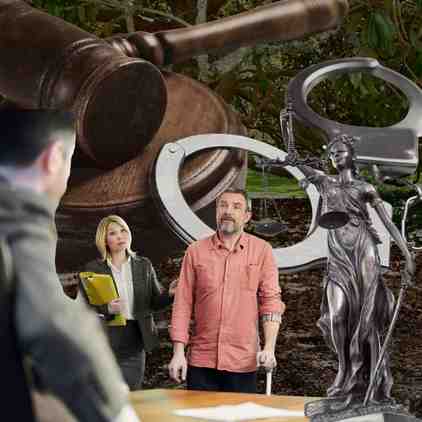
Ahmed Ali Dewan & Co. a law firm provide comprehensive Free Criminal Defense Consultation for individuals facing criminal charges, victims seeking justice, and those requiring legal representation at any stage of the criminal justice system.

We take pride in offering a dedicated Free Criminal Defense Consultation for individuals navigating the complexities of Pakistan’s criminal justice system. Our team of experienced criminal defense attorneys is committed to protecting your rights, providing expert representation, and ensuring justice, regardless of the charges you face.
Pakistan’s criminal justice system can be intimidating and difficult to navigate without expert legal guidance. Whether you are accused of a minor offense or facing serious criminal charges, having a knowledgeable criminal defense attorney can make all the difference. At Ahmed Ali Dewan & Co., stand as your criminal defense lawyers, ready to fight for your rights and pursue the best possible outcome for your case.
The criminal justice system in Pakistan is governed by complex laws such as the Pakistan Penal Code (PPC) and the Code of Criminal Procedure (CrPC), with each stage of the criminal process subject to strict legal procedures. Our criminal defense attorneys have in-depth knowledge of the entire process, from investigation and arrest to trial, appeal, and post-conviction remedies. We understand how critical it is to challenge wrongful charges at every phase and are dedicated to helping our clients achieve the most favorable outcome possible.
Each criminal case is unique. That’s why we develop tailored defense strategies based on the specific circumstances of your case. We don’t apply a one-size-fits-all approach but take the time to thoroughly investigate the facts, identify weaknesses in the prosecution’s case, and craft a defense that is designed to protect your rights. Whether it’s challenging evidence or questioning the credibility of witnesses, our criminal defense attorneys are committed to ensuring that your case is handled with precision and care.
If you believe that a lower court has made an error in your case, our team specializes in criminal revisions and appeals. Criminal revision allows a higher court to review decisions made by lower courts to correct any legal errors or procedural mistakes that may have resulted in an unfair trial or excessive punishment. We are experts in filing and pursuing criminal revision petitions in Pakistan’s courts, seeking to rectify unjust decisions, obtain reduced sentences, or achieve the dismissal of charges.
Whether your case involves a minor offense or serious criminal charges, we are prepared to fight aggressively on your behalf in court. Our criminal defense attorneys are skilled in all aspects of criminal litigation, from pre-trial motions to presenting your case in front of a judge and jury. We are known for our strong trial advocacy and our ability to present compelling arguments that can sway the outcome in your favor.
We are committed to ensuring that you receive a fair trial and that your constitutional rights are upheld at every stage of the criminal justice process. From your initial arrest to any post-conviction appeals, our criminal defense attorneys are dedicated to protecting your rights and fighting against any injustices or violations that may occur throughout the legal proceedings.
We provide expert legal services in a wide range of criminal matters, including but not limited to:
The criminal justice system in Pakistan is complex, with laws, procedures, and court systems that require a clear understanding of the process to ensure a fair trial. Here’s an overview of how the system typically works:
Once a crime is reported, the police initiate an investigation, gather evidence, and, if warranted, make an arrest. At this stage, you may face questioning or detention. A skilled criminal defense attorney can intervene early, ensuring that your rights are protected, and providing guidance during questioning or at any hearings.
After the investigation, the police present their findings, and the prosecution files charges. Pre-trial hearings and motions take place, during which our team challenges illegal evidence, requests bail, or files motions to dismiss charges if there is insufficient evidence.
The trial involves the prosecution presenting evidence and witnesses, followed by your defense team challenging the case against you. Our criminal defense attorneys are expert trial lawyers who know how to present evidence, cross-examine witnesses, and argue persuasively to protect your rights.
If convicted, the court will impose a sentence. We ensure that the sentence is fair and work to minimize its severity by presenting mitigating factors or seeking an alternative sentencing option, such as probation.
After a conviction, if there is any legal error or injustice, our team is prepared to file for criminal revision or appeals to a higher court. This can lead to a reduction in your sentence, a new trial, or even the dismissal of charges. We are committed to pursuing every legal remedy to correct any injustice.
Facing criminal charges can be one of the most stressful experiences of your life. Without a skilled criminal defense attorney, you may not be fully aware of your legal rights or the potential consequences you face. The stakes are high, and you deserve experienced legal representation to protect your future.
We fight tirelessly to ensure that the criminal justice system in Pakistan works in your favor, providing you with expert advice and dedicated legal support throughout your case. We understand the nuances of the law and will work to get you the best possible outcome.
If you or someone you know is involved in a criminal case or facing criminal charges in Pakistan, don’t navigate the system alone. Contact Ahmed Ali Dewan & Co. today to schedule a legal consultation with one of our experienced criminal defense attorney. We are here to protect your rights, challenge any wrongful charges, and provide the expert legal support you need at every stage of the criminal justice system.
Call us now or fill out our online form to get started on building a strong defense today!
✔ Experienced Criminal Defense Attorney – Decades of expertise in handling bail, appeals, and trials.
✔ Strong Legal Representation – A commitment to protecting your rights and ensuring a fair trial.
✔ Fast & Effective Bail Processing – Speedy legal action to secure bail and prevent unnecessary detention.
✔ Personalized Legal Support – Dedicated case handling tailored to individual client needs.
If you or a loved one needs legal assistance with bail, appeals, or trial defense, contact us today for expert legal services in Pakistan’s criminal courts.
“Ahmed Ali Dewan & Co. is a trusted law firm specializing in intellectual property, criminal law, family law, and corporate law. We provide expert legal services tailored to your needs, offering professional guidance in complex legal matters. Contact us today”